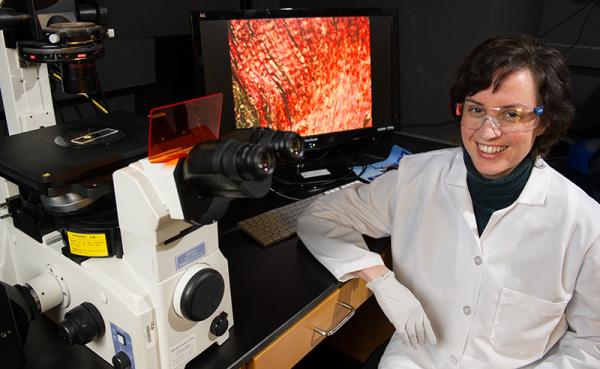For a baseball pitcher, a rotator cuff injury often means an extended stay on the disabled list for surgery and rehabilitation of the damaged tendons. But a new technology under development may stop this shoulder injury from becoming so severe that surgery is required.
A research team is attempting to engineer an injectable therapy for the shoulder’s supraspinatus tendon, a rotator cuff tendon that is commonly torn in sports. When the tendon is damaged, the body makes things worse by activating enzymes that further break down the tendon. The scientists hope to develop an injectable compound that would deliver an inhibitor capable of blocking these enzymes, thereby reducing the severity of the injury or even healing the tissue.
“Normally people focus on treating tendon injuries after the tear has occurred, but we’re focusing on a much earlier stage in the disease,” said Johnna Temenoff, an associate professor in the Wallace H. Coulter Department of Biomedical Engineering at Georgia Tech and Emory University. “This is the first time that an injectable therapy specifically designed to interact with tissue at an early disease state has been attempted for this particular tendon injury.”
Temenoff’s work is supported by a $1 million grant from the National Institute of Arthritis and Musculoskeletal and Skin Diseases (NIAMS) for five years of research, which began in September 2013. Collaborating on the research is Manu Platt, an assistant professor in the same department. Temenoff’s previous work on tendon injuries, which focused on quarterbacks in football, was sponsored by the NFL Charities.
Shoulder tendon injuries are common overuse injuries for athletes and also for industrial workers whose repetitive overhead motion put them at risk. The rotator cuff is a collation of four tendons, and the tendons are made of collagen. Overuse of the tendons damages the collagen, and people feel stiff and sore in their shoulders as the area becomes weaker.
Once a tendon is damaged, the body accelerates the damage by activating enzymes that eat at the tendon, worsening the condition over time.
“The interesting thing about this disease is that we don’t know exactly what causes it,” Temenoff said. “We’re studying enzymes that are known to chew up the collagen, and we’re looking at then delivering inhibitors to those enzymes in a local injection in the tendon to try to stop the degradation.”
In their research, the team will use an animal model to characterize when these collagen-destroying enzymes are the most active. This will give researchers a good idea of when to inject inhibitors.
So that patients won’t need multiple shots, the scientists are working on a drug delivery material that will release the inhibitors over time once inside the body. One idea is to control the interactions between the inhibitors and small amounts of the blood thinner heparin. The team will also study the histology and mechanics of the tendons after healing.
Temenoff said that the injectable therapy could, in theory, work on other kinds of tendon injuries, not just in the shoulder.
“We’re studying the disease in the shoulder, but it’s the same disease that causes tennis elbow, Achilles injuries, and jumper’s knee,” Temenoff said. “It’s the same process, just in different tendons in the body.”
This research is supported by the National Institute of Arthritis and Musculoskeletal and Skin Diseases (NIAMS) under award1R01AR063692-01A1. Any conclusions or opinions are those of the authors and do not necessarily represent the official views of NIAMS.
Research News
Georgia Institute of Technology
177 North Avenue
Atlanta, Georgia 30332-0181 USA
Media Relations Contacts: Brett Israel (404-385-1933) (brett.israel@comm.gatech.edu) or John Toon (404-894-6986) (jtoon@gatech.edu)
Writer: Brett Israel
Media Contact
Brett Israel
404-385-1933
Keywords
Latest BME News
Jo honored for his impact on science and mentorship
The department rises to the top in biomedical engineering programs for undergraduate education.
Commercialization program in Coulter BME announces project teams who will receive support to get their research to market.
Courses in the Wallace H. Coulter Department of Biomedical Engineering are being reformatted to incorporate AI and machine learning so students are prepared for a data-driven biotech sector.
Influenced by her mother's journey in engineering, Sriya Surapaneni hopes to inspire other young women in the field.
Coulter BME Professor Earns Tenure, Eyes Future of Innovation in Health and Medicine
The grant will fund the development of cutting-edge technology that could detect colorectal cancer through a simple breath test
The surgical support device landed Coulter BME its 4th consecutive win for the College of Engineering competition.








